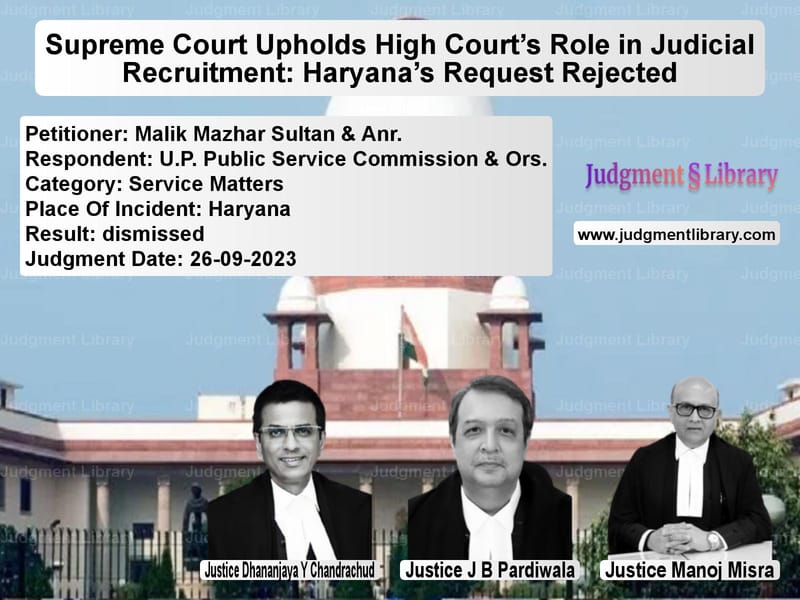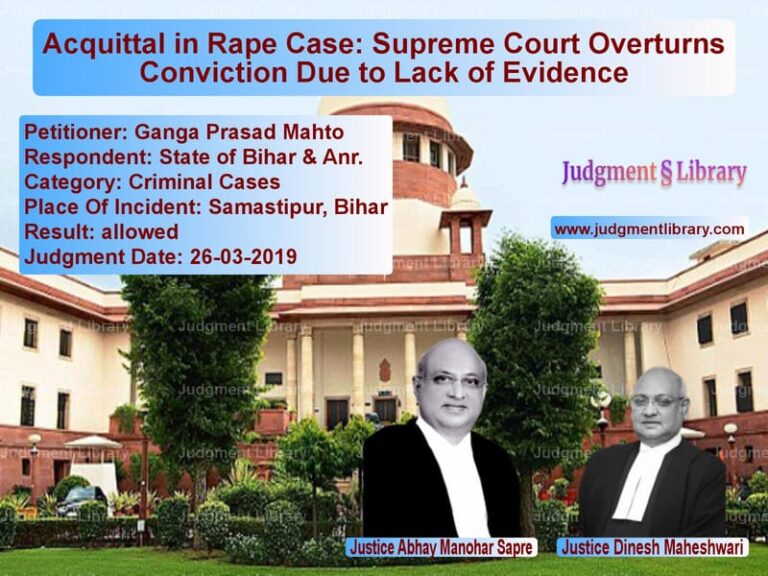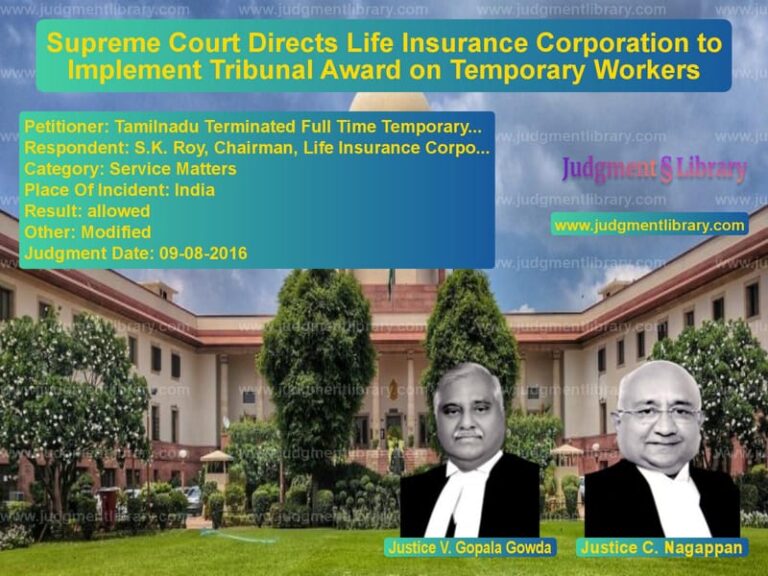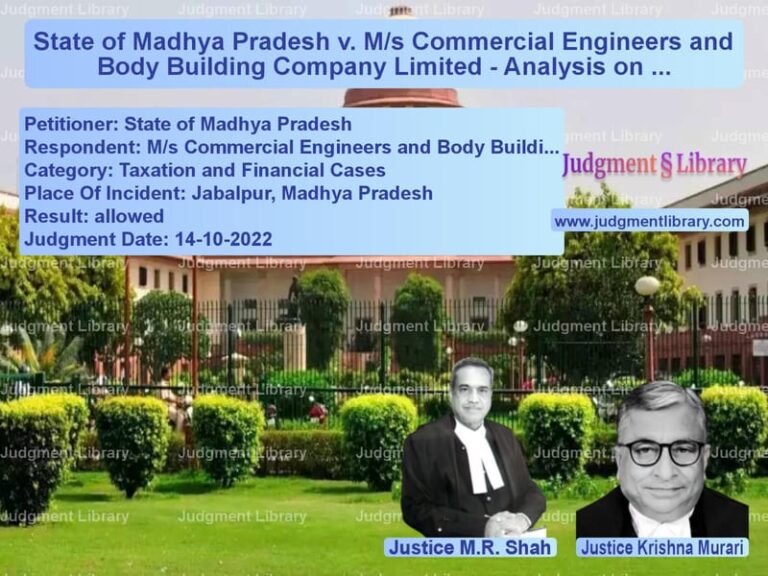Supreme Court Upholds High Court’s Role in Judicial Recruitment: Haryana’s Request Rejected
The Supreme Court of India recently delivered a significant judgment in the case of Malik Mazhar Sultan & Anr. vs. U.P. Public Service Commission & Ors., wherein the State of Haryana sought to alter the existing judicial recruitment process. The state government had requested that the entire recruitment process for Junior Civil Judges be conducted solely through the Public Service Commission, excluding the High Court’s oversight. The Supreme Court firmly rejected this request, reaffirming the need for the High Court’s involvement to ensure transparency and judicial independence in the recruitment process.
Background of the Case
The case revolved around Haryana’s attempt to modify the recruitment process of Junior Civil Judges. Previously, the selection process was conducted under a Selection Committee comprising three High Court judges, the Chief Secretary, the Advocate General, and the Chairman of the Public Service Commission. This structure had been in place since 2007 and was designed to ensure fair and independent judicial appointments.
However, the Haryana government, citing procedural preferences, sought to remove the High Court’s role and hand over full control of the recruitment process to the Public Service Commission, claiming that the Punjab Civil Service (Judicial Branch) Rules, 1951, mandated such an approach.
Key Legal Issues Raised
- Should judicial recruitment in Haryana be conducted exclusively by the Public Service Commission, without the involvement of the High Court?
- Did the Supreme Court’s previous rulings support Haryana’s claim to modify the selection process?
- Would the removal of High Court oversight affect the transparency and integrity of the judicial recruitment process?
Arguments by the State of Haryana
The Haryana government made several points in favor of its request:
- The Punjab Civil Service (Judicial Branch) Rules, 1951, originally placed judicial recruitment under the Public Service Commission’s purview.
- Although the state had made yearly amendments since 2007 to include the High Court, these were temporary modifications, not permanent changes.
- Haryana argued that a return to the original rules would streamline recruitment and remove unnecessary complexities.
- The government emphasized that the Supreme Court’s 2007 ruling in Malik Mazhar Sultan required that recruitment be conducted according to each state’s existing rules.
Arguments by the High Court of Punjab and Haryana
The High Court firmly opposed Haryana’s attempt to remove its involvement from the selection process. It made the following arguments:
- The existing system, in place since 2007, had ensured a fair, independent, and transparent recruitment process.
- Judicial recruitment is distinct from other government recruitment processes, and High Court oversight is essential to maintain the integrity of judicial appointments.
- The removal of the High Court from the process could lead to undue executive influence in judicial appointments.
- Since 2007, Haryana had voluntarily implemented amendments allowing the High Court’s role. There was no compelling reason to revert to an outdated system.
Supreme Court’s Analysis and Judgment
The Supreme Court, after hearing both parties, ruled in favor of maintaining the existing selection process. The Court made several critical observations:
1. The Need for Judicial Oversight
The Court noted that judicial independence is a fundamental principle of governance. It stated:
“If the State Government wished to bring about any change in the judicial recruitment process, it was incumbent upon it to consult the High Court and justify the modification with objective data.”
Since Haryana had not provided any such data, its request lacked merit.
2. The Role of the Public Service Commission
The Supreme Court clarified that while the Public Service Commission plays a vital role in recruitment, judicial appointments require additional safeguards. The Court emphasized:
“Judges of the High Court who participate in the selection process have domain knowledge both of the subject and of the nature of the service.”
Thus, judicial oversight could not be arbitrarily removed.
3. The Importance of Consistency
The Court rejected Haryana’s argument that the selection process should be altered based on the original 1951 rules, pointing out:
“The consistent course of action followed since 2007 ensured fair judicial recruitment. Any deviation must be justified with compelling reasons, which Haryana has failed to provide.”
Impact of the Judgment
The ruling carries significant implications for judicial recruitment processes across India. Some key takeaways include:
- The judgment reinforces the role of High Courts in ensuring fair and transparent judicial appointments.
- It prevents potential executive overreach into the judicial selection process.
- It sets a precedent that procedural changes in judicial recruitment must be based on objective justifications, not administrative preferences.
- It ensures that vacancies in the judiciary are filled through an independent and impartial mechanism.
Conclusion
The Supreme Court’s verdict in Malik Mazhar Sultan & Anr. vs. U.P. Public Service Commission & Ors. stands as a landmark judgment that safeguards the independence of judicial appointments. By rejecting Haryana’s request to remove the High Court from the selection process, the Court has ensured that future judicial recruitment remains transparent and free from political or administrative interference.
The ruling also underscores the importance of adhering to long-standing recruitment procedures that have proven effective, rather than making arbitrary changes without compelling reasons.
As Haryana moves forward with the recruitment of 175 Junior Civil Judges, the judgment serves as a reminder that judicial appointments must be conducted with the highest standards of fairness, accountability, and transparency.
Petitioner Name: Malik Mazhar Sultan & Anr..Respondent Name: U.P. Public Service Commission & Ors..Judgment By: Justice Dhananjaya Y Chandrachud, Justice J B Pardiwala, Justice Manoj Misra.Place Of Incident: Haryana.Judgment Date: 26-09-2023.
Don’t miss out on the full details! Download the complete judgment in PDF format below and gain valuable insights instantly!
Download Judgment: malik-mazhar-sultan-vs-u.p.-public-service-supreme-court-of-india-judgment-dated-26-09-2023.pdf
Directly Download Judgment: Directly download this Judgment
See all petitions in Recruitment Policies
See all petitions in Public Sector Employees
See all petitions in Judgment by Dhananjaya Y Chandrachud
See all petitions in Judgment by J.B. Pardiwala
See all petitions in Judgment by Manoj Misra
See all petitions in dismissed
See all petitions in supreme court of India judgments September 2023
See all petitions in 2023 judgments
See all posts in Service Matters Category
See all allowed petitions in Service Matters Category
See all Dismissed petitions in Service Matters Category
See all partially allowed petitions in Service Matters Category







